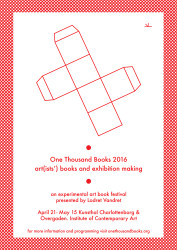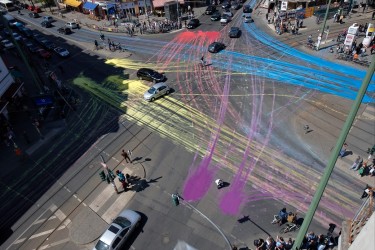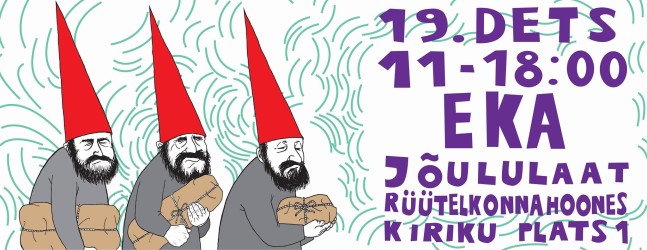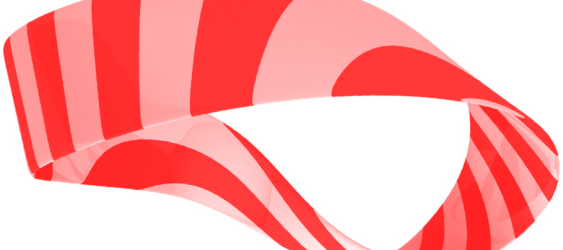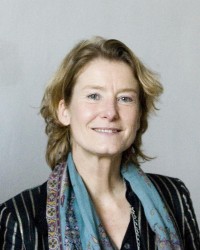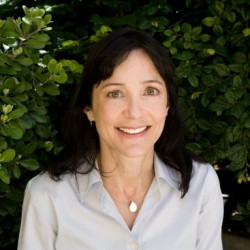Events
21.04.2016 — 24.04.2016
Lugemik shows Soviet Estonian design in Denmark
Lugemik Publishing is participating in an experimental art book festival “One Thousand Books 2016”, 21–24 April in Copenhagen, Denmark. During the four-day festival a seminar on artists’ books and exhibition making will take place, also the exhibition “Manifolds” will open in Kunsthal Charlottenborg, remaining open until 15 May.
13 international publishers are invited to participate in the exhibition and to curate their own show based on one of their publications.
In cooperation with the Estonian Museum of Applied Art and Design (ETDM) Lugemik will present the book “Nobody Expected There Would Be Much Discussion About It”, compiled and designed by Ott Metusala. The book documents the design work of author’s grandmother Kirsti Metusala at the Tallinn Experimental Plant Estoplast, where she worked as a designer for 28 years (1964-1992). The book includes historical photo documentation of the Estoplast lamps which is accompanied by an interview with Kirsti Metusala, explaining her tasks and describing in detail the design process of the lamps, thus speaking about designer’s profession in Soviet Estonia. The book also contains an essay written by Kai Lobjakas, director of ETDM and curator of the design collection, discussing the Soviet Estonian design and the importance of the production of Estoplast factory in a broader context.
In the exhibition “Manifolds” the book is accompanied by an exposition consisting of Estoplast lamps, and the film “The Lights Come On”. For the exposition Lugemik and Ott Metusala will exchange eight Poul Henningsen lamps in the lobby, specially designed for Kunsthal Charlottenborg, for Estoplast lamps designed by Kirsti Metusala. In the exhibition space the book will be given context by the documentary “The Lights Come On” (1967, Estonian Television Company) by Jaak Mamers, which in a staged manner depicts the production process of the Estoplast factory.
The festival “One Thousand Books” is organised by the Danish publishers Lodret Vandret since 2013.
Ott Metusala (born 1988, Tallinn) is a graphic designer based in Amsterdam, the Netherlands. He graduated from the graphic design departments of both Estonian Academy of Arts and Gerrit Rietveld Academie. Currently his work involves music publishing, editorial projects and book designs, both self-initiated and commission based, in close collaboration with friends, artists and institutions. He has also taught in the graphic design department of Estonian Academy of Arts.
Lugemik is an independent publishing initiative based in Tallinn, Estonia, founded in 2010 by graphic designer Indrek Sirkel and artist Anu Vahtra. Lugemik publishes books and other printed matter, working closely together with artists, writers, designers, printers in every step of the publishing process. In 2013 Lugemik opened a bookshop on the premises of Contemporary Art Museum Estonia (EKKM) and is currently working on opening a new bookshop in collaboration with Tallinn Art Hall. In 2015 Lugemik was joined by the curator and artist Laura Toots for extended activities with artists beyond publishing projects.
The book is supported by the Cultural Endowment of Estonia, Lugemik’s activities are supported by the Estonian Ministry of Culture.
Festival “One Thousand Books”
21–24 April 2016
Kunsthal Charlottenborg
Exhibition “Manifolds”
23 April – 15 May 2016
Kunsthal Charlottenborg
www.onethousandbooks.org
www.metusala.ee
Press release by:
Lugemik Publishing
info@lugemik.ee
www.facebook.com/lugemik
www.lugemik.ee
Lugemik shows Soviet Estonian design in Denmark
Thursday 21 April, 2016 — Sunday 24 April, 2016
Lugemik Publishing is participating in an experimental art book festival “One Thousand Books 2016”, 21–24 April in Copenhagen, Denmark. During the four-day festival a seminar on artists’ books and exhibition making will take place, also the exhibition “Manifolds” will open in Kunsthal Charlottenborg, remaining open until 15 May.
13 international publishers are invited to participate in the exhibition and to curate their own show based on one of their publications.
In cooperation with the Estonian Museum of Applied Art and Design (ETDM) Lugemik will present the book “Nobody Expected There Would Be Much Discussion About It”, compiled and designed by Ott Metusala. The book documents the design work of author’s grandmother Kirsti Metusala at the Tallinn Experimental Plant Estoplast, where she worked as a designer for 28 years (1964-1992). The book includes historical photo documentation of the Estoplast lamps which is accompanied by an interview with Kirsti Metusala, explaining her tasks and describing in detail the design process of the lamps, thus speaking about designer’s profession in Soviet Estonia. The book also contains an essay written by Kai Lobjakas, director of ETDM and curator of the design collection, discussing the Soviet Estonian design and the importance of the production of Estoplast factory in a broader context.
In the exhibition “Manifolds” the book is accompanied by an exposition consisting of Estoplast lamps, and the film “The Lights Come On”. For the exposition Lugemik and Ott Metusala will exchange eight Poul Henningsen lamps in the lobby, specially designed for Kunsthal Charlottenborg, for Estoplast lamps designed by Kirsti Metusala. In the exhibition space the book will be given context by the documentary “The Lights Come On” (1967, Estonian Television Company) by Jaak Mamers, which in a staged manner depicts the production process of the Estoplast factory.
The festival “One Thousand Books” is organised by the Danish publishers Lodret Vandret since 2013.
Ott Metusala (born 1988, Tallinn) is a graphic designer based in Amsterdam, the Netherlands. He graduated from the graphic design departments of both Estonian Academy of Arts and Gerrit Rietveld Academie. Currently his work involves music publishing, editorial projects and book designs, both self-initiated and commission based, in close collaboration with friends, artists and institutions. He has also taught in the graphic design department of Estonian Academy of Arts.
Lugemik is an independent publishing initiative based in Tallinn, Estonia, founded in 2010 by graphic designer Indrek Sirkel and artist Anu Vahtra. Lugemik publishes books and other printed matter, working closely together with artists, writers, designers, printers in every step of the publishing process. In 2013 Lugemik opened a bookshop on the premises of Contemporary Art Museum Estonia (EKKM) and is currently working on opening a new bookshop in collaboration with Tallinn Art Hall. In 2015 Lugemik was joined by the curator and artist Laura Toots for extended activities with artists beyond publishing projects.
The book is supported by the Cultural Endowment of Estonia, Lugemik’s activities are supported by the Estonian Ministry of Culture.
Festival “One Thousand Books”
21–24 April 2016
Kunsthal Charlottenborg
Exhibition “Manifolds”
23 April – 15 May 2016
Kunsthal Charlottenborg
www.onethousandbooks.org
www.metusala.ee
Press release by:
Lugemik Publishing
info@lugemik.ee
www.facebook.com/lugemik
www.lugemik.ee
24.05.2016 — 08.06.2016
GRADUATION WORK DEFENCES IN 2015/2016 SPRING SEMESTER
Spring semester’s graduation work defences are shown in the attached file (in Estonian).
GRADUATION WORK DEFENCES IN 2015/2016 SPRING SEMESTER
Tuesday 24 May, 2016 — Wednesday 08 June, 2016
Spring semester’s graduation work defences are shown in the attached file (in Estonian).
26.02.2016
Wild Talks at Interior Architecture Department
This Friday, we kick off WILD TALKs, the new public lecture series of our department. The speakers of the series could be characterised by two main threads of action. Some of them have created as much havoc as an elk would, wandering into a city, just by ignoring general customs and habits. Others have unearthed things about life by closely studying the periphery. Summing this up, we believe that these speakers have the potential to spark inspiration in not only interior architecture students, but anyone with any relationship to space around them.
First on the WILD TALKs stage will be Berlin-based Dutch guerilla artist IEPE RUBINGH who dumped 500 litres of paint on Rosenthaler Platz, turning the intersection into a huge canvas and making Berliners guess for months whether this was a ‘Guerrilla Advertising Campaign’ or an artwork. Additionally, he is the inventor of the hybrid sport ‘Chess Boxing’ and is the director of the World Chess Boxing Organisation, with clubs in Siberia, London, Los Angeles and Berlin.
In addition to being the opening speaker for WILD TALKs, Rubingh will also run a workshop for the MA course Wild Studio at the interior architecture department.
WILD TALKs is supported by Astelpajunaps and Valmiermuiža. All talks will be in English.
Wild Talks at Interior Architecture Department
Friday 26 February, 2016
This Friday, we kick off WILD TALKs, the new public lecture series of our department. The speakers of the series could be characterised by two main threads of action. Some of them have created as much havoc as an elk would, wandering into a city, just by ignoring general customs and habits. Others have unearthed things about life by closely studying the periphery. Summing this up, we believe that these speakers have the potential to spark inspiration in not only interior architecture students, but anyone with any relationship to space around them.
First on the WILD TALKs stage will be Berlin-based Dutch guerilla artist IEPE RUBINGH who dumped 500 litres of paint on Rosenthaler Platz, turning the intersection into a huge canvas and making Berliners guess for months whether this was a ‘Guerrilla Advertising Campaign’ or an artwork. Additionally, he is the inventor of the hybrid sport ‘Chess Boxing’ and is the director of the World Chess Boxing Organisation, with clubs in Siberia, London, Los Angeles and Berlin.
In addition to being the opening speaker for WILD TALKs, Rubingh will also run a workshop for the MA course Wild Studio at the interior architecture department.
WILD TALKs is supported by Astelpajunaps and Valmiermuiža. All talks will be in English.
24.03.2016
Open Day March 24, 2016
The Open Day at the Estonian Academy of Arts will take place on March 24, 2016 from 10am-6pm. If you are a foreign student and need guidance in English, please contact admissions@artun.ee to register for a tour. The programme is posted in Estonian here: https://www.artun.ee/x/avatuduksed/kava/
Open Day March 24, 2016
Thursday 24 March, 2016
The Open Day at the Estonian Academy of Arts will take place on March 24, 2016 from 10am-6pm. If you are a foreign student and need guidance in English, please contact admissions@artun.ee to register for a tour. The programme is posted in Estonian here: https://www.artun.ee/x/avatuduksed/kava/
29.01.2016 — 31.01.2016
First ever Estonian creative industries hackathon!
Dear student!
The first ever Estonian creative industries hackathon will be held in
Tallinn from the *29th to the 31st* *of January*. *Loomehäkk* will bring
together creative minds, IT specialists and business development experts.
During 48 hours the participants will create new products and services in
fields like gaming, movies, music, cultural heritage, design, television,
art, literature and performing arts.
You can join the Loomehäkk hackathon with your idea and team, or you may
come and listen to the ideas of others in order to join a cool team. Top
creative industry and startup mentors will help the teams with their skills
and know-how. Ideation and team matchmaking will take place on Friday. On
Sunday evening the teams must be ready to present their service/product
prototype in front of a jury. The jury will pick the best teams and will
hand out awesome prizes.
All the hackathon partners will provide challenges/problems, industry
trends and development ideas that can serve as a starting point for the new
service/product.
Partners of Loomehäkk include: Digix, IGDA, GameFounders, Estonian Digital
Center, Creative Mobile, Tallinn University, Estonian Academy of Arts,
Estonian Academy of Music and Theatre, Estonian Business School, UT
Viljandi Culture Academy, Estonian Entrepreneurship University of Applied
Sciences, University of Tartu, Estonian University of Life Sciences,
Tallinn University of Technology, Music Estonia, Black Nights Film
Festival, Estonian Film Institute, Estonian Public Broadcasting, Brand
Manual, TERE AS, Microsoft, Eesti Telekom/VUNK, Estonian National Museum,
Estonian Film Archives.
Participation is free of charge for all students. University discount code
*EKA2016 *is required during the registration process. Please be prepared
to present a document (e.g. ISIC card) on the site to prove your student
status.
Register for the event: https://www.amiando.com/ORFXBGM
Additional information available at:
https://www.facebook.com/events/1171478069548695/
Contact person: Marek Mühlberg, marekm@tlu.ee, +372 5510204
First ever Estonian creative industries hackathon!
Friday 29 January, 2016 — Sunday 31 January, 2016
Dear student!
The first ever Estonian creative industries hackathon will be held in
Tallinn from the *29th to the 31st* *of January*. *Loomehäkk* will bring
together creative minds, IT specialists and business development experts.
During 48 hours the participants will create new products and services in
fields like gaming, movies, music, cultural heritage, design, television,
art, literature and performing arts.
You can join the Loomehäkk hackathon with your idea and team, or you may
come and listen to the ideas of others in order to join a cool team. Top
creative industry and startup mentors will help the teams with their skills
and know-how. Ideation and team matchmaking will take place on Friday. On
Sunday evening the teams must be ready to present their service/product
prototype in front of a jury. The jury will pick the best teams and will
hand out awesome prizes.
All the hackathon partners will provide challenges/problems, industry
trends and development ideas that can serve as a starting point for the new
service/product.
Partners of Loomehäkk include: Digix, IGDA, GameFounders, Estonian Digital
Center, Creative Mobile, Tallinn University, Estonian Academy of Arts,
Estonian Academy of Music and Theatre, Estonian Business School, UT
Viljandi Culture Academy, Estonian Entrepreneurship University of Applied
Sciences, University of Tartu, Estonian University of Life Sciences,
Tallinn University of Technology, Music Estonia, Black Nights Film
Festival, Estonian Film Institute, Estonian Public Broadcasting, Brand
Manual, TERE AS, Microsoft, Eesti Telekom/VUNK, Estonian National Museum,
Estonian Film Archives.
Participation is free of charge for all students. University discount code
*EKA2016 *is required during the registration process. Please be prepared
to present a document (e.g. ISIC card) on the site to prove your student
status.
Register for the event: https://www.amiando.com/ORFXBGM
Additional information available at:
https://www.facebook.com/events/1171478069548695/
Contact person: Marek Mühlberg, marekm@tlu.ee, +372 5510204
24.03.2016
Open Day March 24, 2016
The Estonian Academy of Arts will hold an Open Day for all interested prospective students and others on March 24th, 2016. All lectures are open for visitors as well as there will be exhibits, information hours in departments and other activities. All are welcome! More information will be available soon.
Open Day March 24, 2016
Thursday 24 March, 2016
The Estonian Academy of Arts will hold an Open Day for all interested prospective students and others on March 24th, 2016. All lectures are open for visitors as well as there will be exhibits, information hours in departments and other activities. All are welcome! More information will be available soon.
19.12.2015
EAA Christmas fair on Dec 19th at Kiriku plats 1, 11am-6pm
EAA Christmas fair on Dec 19th at Kiriku plats 1, 11am-6pm
Saturday 19 December, 2015
07.12.2015 — 23.01.2016
Kilometre of Sculpture, Rakvere 2016 OPEN CALL
Selection panel: Andreas Nilsson (SE), Anna Virtanen (FI), Teet Suur (EE) and Siim Preiman (EE)
The organisers of Kilometre of Sculpture (kmS) are pleased to extend a warm invitation to all artists working in any field or genre to submit applications to participate in our open call exhibition, which will be held in the public space of the town of Rakvere in July 2016.
Applications close 23 January 2016
Artists applying to the open call for 2016 will be expected to respond to the specific context of the township of Rakvere, selecting from the multitude of sites and situations that exist across this varied urbanscape, as well as the conceptual considerations presented below by our guest curator, Anna Virtanen. A site map, which can be viewed on our website, shows a circle approximately 1 kilometre across indicating a suggested area within which artists can explore potential sites for their work. As this area is only meant as a guide, sites outside the circle will also be considered if the reasoning behind the choice of site is clear.
The following reflects the initial curatorial impulse:
“How to approach a city unfamiliar to you, in an unfamiliar country? How to work in the public space, with a manner sensitive to the context at hand, when you’re not familiar with the stories, memories or meanings attached to it? As a way of approaching these questions, in our initial theme for the 2016 edition of Kilometre of Sculpture, we take a look at monuments. Considering monuments as manifestations of the invisible, of values, agendas, ideologies or histories. Or looking at them in relation to the notions of permanence and temporality – of the material aspects, of the invisible linked to them. Looking at monuments as representing something that is hoped to be static, emphasizing this even with their material qualities, holding onto something temporary.”
Anna Virtanen
Kilometre of Sculpture
Kilometre of Sculpture is an international outdoor art exhibition held every year in the public space of a regional city in Estonia. The town of Rakvere in northern Estonia hosts the exhibition every two years in conjunction with the Baltoscandal theatre festival, while different regional Estonian towns host the exhibition in the intervening years. KmS adopts a mixed model involving a curated section and an open call to deliver a single cohesive exhibition under the guiding vision of our curator. In addition, kmS also has a side program of exhibitions and events known as kmX that is largely sourced via connections with regional towns in neighbouring countries (often involving the twin town network).
The site map mentioned above and specific information on how to apply can be found by following the link below.
www.sculpture.ee/en/apply
General enquiries: kilometre@sculpture.ee
Kilometre of Sculpture, Rakvere 2016 OPEN CALL
Monday 07 December, 2015 — Saturday 23 January, 2016
Selection panel: Andreas Nilsson (SE), Anna Virtanen (FI), Teet Suur (EE) and Siim Preiman (EE)
The organisers of Kilometre of Sculpture (kmS) are pleased to extend a warm invitation to all artists working in any field or genre to submit applications to participate in our open call exhibition, which will be held in the public space of the town of Rakvere in July 2016.
Applications close 23 January 2016
Artists applying to the open call for 2016 will be expected to respond to the specific context of the township of Rakvere, selecting from the multitude of sites and situations that exist across this varied urbanscape, as well as the conceptual considerations presented below by our guest curator, Anna Virtanen. A site map, which can be viewed on our website, shows a circle approximately 1 kilometre across indicating a suggested area within which artists can explore potential sites for their work. As this area is only meant as a guide, sites outside the circle will also be considered if the reasoning behind the choice of site is clear.
The following reflects the initial curatorial impulse:
“How to approach a city unfamiliar to you, in an unfamiliar country? How to work in the public space, with a manner sensitive to the context at hand, when you’re not familiar with the stories, memories or meanings attached to it? As a way of approaching these questions, in our initial theme for the 2016 edition of Kilometre of Sculpture, we take a look at monuments. Considering monuments as manifestations of the invisible, of values, agendas, ideologies or histories. Or looking at them in relation to the notions of permanence and temporality – of the material aspects, of the invisible linked to them. Looking at monuments as representing something that is hoped to be static, emphasizing this even with their material qualities, holding onto something temporary.”
Anna Virtanen
Kilometre of Sculpture
Kilometre of Sculpture is an international outdoor art exhibition held every year in the public space of a regional city in Estonia. The town of Rakvere in northern Estonia hosts the exhibition every two years in conjunction with the Baltoscandal theatre festival, while different regional Estonian towns host the exhibition in the intervening years. KmS adopts a mixed model involving a curated section and an open call to deliver a single cohesive exhibition under the guiding vision of our curator. In addition, kmS also has a side program of exhibitions and events known as kmX that is largely sourced via connections with regional towns in neighbouring countries (often involving the twin town network).
The site map mentioned above and specific information on how to apply can be found by following the link below.
www.sculpture.ee/en/apply
General enquiries: kilometre@sculpture.ee
17.12.2015
Beatrice von Bismarck open lecture
On Thursday, December 17th 6PM we are pleased to host curator and professor of Academy of Visual Arts Leipzig Beatrice von Bismarck who will hold an open lecture „Valorisation Machines or The Exhibition as (Re-)Staging: “When Attitudes Become Form – Bern 1969/ Venice 2013”, Venice Biennial 2013“. The lecture will take place at the main hall of Estonian Academy of Sciences, Kohtu 6.
Exhibitions are in general performative. They bring their exhibits on stage by making them public. Furthermore they involve them in a process of meaning production through embedding them into new constellations. Over the course of processes of shifts and transpositions, additions and commentaries they create different relations between the exhibits and other objects on show as well as display devices, sites and spaces, people and discourses. Exhibitions are thus always temporally defined and this through the temporary structure of their exhibits as much as through their own rhythms, processes and duration.
With the exhibition “When Attitudes Become Form” (Bern, 1969) process and ephemerality have been inscribed not only into the history of art but also into the rather younger history of exhibitions. While a number of other curatorial initiatives around the late 1960s and early 1970s offered similarly oriented contributions to the discourse, the Swiss show and its curator Harald Szeemann acquired a particularly outstanding, almost legendary reputation. The re-staging of this show in 2013 in Venice at the Prada Foundation under the title of “When Attitudes Become Form -Bern 1969/ Venice 2013” implied a de-contextualisation and a resulting shift of meaning not only in aesthetic terms. Hand in hand with the alterations of the temporal and material conditions of the exhibits went a number of re-valorisations and capitalizations, which affected the artistic works, but also the participating artists, the curators and the exhibition itself. The Venice exhibition can thus be treated as a paradigm not only with regards to the theatrical nature of exhibiting but also to the meaning and value production of its performative capacities.
Beatrice von Bismarck (Leipzig/ Berlin), professor at the Academy of Visual Arts Leipzig for Art History, Visual Culture and Cultures of the Curatorial. 1989 – 1993 Städel Museum, Frankfurt/Main curator 20th Century art. 1993 – 1999 Lüneburg University, co-founder and -director of the project-space „Kunstraum der Universität Lüneburg“. 2000 co-founder of the project-space „/D/O/C/K-Projektbereich“. 2009 initiator of the MA-program “Cultures of the Curatorial“. Research areas: The curatorial; effects of neo-liberalism and globalization on the cultural field; postmodern concepts of the „artist“.
Currently on research leave for a book on “The Curatorial” financed by the “Opus magnum”-program of the VWStiftung.
Publications include: – Games Fights Collaborations. Art and Cultural Studies in the 90s, Ostfildern-Ruit 1996. (ed. with Diethelm Stoller, Ulf Wuggenig); – Interarchive. Archival Practices and Sites in the Contemporary Art Field, Cologne 2002. (ed. with Hans-Peter Feldmann, Hans Ulrich Obrist, Diethelm Stoller, Ulf Wuggenig); – Grenzbespielungen. Visuelle Politik in der Übergangszone (Performing the Border. Visual Politics in Zones of Transgression), (ed.), Cologne 2005; – Globalisierung/Hierarchisierung. Kulturelle Dominanzen in Kunst und Kunstgeschichte (Globalization/ Hierarchization. Cultural Dominances in Art and Art History), Marburg 2005 (ed. with Irene Below); – beyond education. Kunst, Ausbildung, Arbeit und Ökonomie, (beyond education. Art, Education, Work and Economy), Frankfurt a. M. 2005 (ed. with Alexander Koch); – Nach Bourdieu: Visualität, Kunst, Politik (After Bourdieu. Visuality, Art, Politics), Vienna 2008 (ed. with Therese Kaufmann, Ulf Wuggenig); – Auftritt als Künstler (Performance as Artist), Cologne 2010; – Cultures of the Curatorial (ed. With Jörn Schaffaf and Thomas Weski), Berlin 2012; – Timing – On the Temporal Dimension of Exhibiting (ed. with Rike Frank, Benjamin Meyer-Krahmer, Jörn Schafaff, and Thomas Weski), Berlin 2014; – Hospitality – Hosting Relations in Exhibitions, (ed. with Benjamin Meyer-Krahmer), Berlin (about to come out in January 2016).
The public lecture will be preceded by a reading group of prof von Bismarck’s earlier texts, to be taking place on Wednesday, December 9th at 4PM at the Centre for Contemporary Art Estonia, please register rebeka@cca.ee.
Beatrice von Bismarck will also be holding a seminar at the Institute of Art History on December 18th, 10 AM, room 104. For participation please email ingrid.ruudi@artun.ee
Beatrice von Bismarck open lecture
Thursday 17 December, 2015
On Thursday, December 17th 6PM we are pleased to host curator and professor of Academy of Visual Arts Leipzig Beatrice von Bismarck who will hold an open lecture „Valorisation Machines or The Exhibition as (Re-)Staging: “When Attitudes Become Form – Bern 1969/ Venice 2013”, Venice Biennial 2013“. The lecture will take place at the main hall of Estonian Academy of Sciences, Kohtu 6.
Exhibitions are in general performative. They bring their exhibits on stage by making them public. Furthermore they involve them in a process of meaning production through embedding them into new constellations. Over the course of processes of shifts and transpositions, additions and commentaries they create different relations between the exhibits and other objects on show as well as display devices, sites and spaces, people and discourses. Exhibitions are thus always temporally defined and this through the temporary structure of their exhibits as much as through their own rhythms, processes and duration.
With the exhibition “When Attitudes Become Form” (Bern, 1969) process and ephemerality have been inscribed not only into the history of art but also into the rather younger history of exhibitions. While a number of other curatorial initiatives around the late 1960s and early 1970s offered similarly oriented contributions to the discourse, the Swiss show and its curator Harald Szeemann acquired a particularly outstanding, almost legendary reputation. The re-staging of this show in 2013 in Venice at the Prada Foundation under the title of “When Attitudes Become Form -Bern 1969/ Venice 2013” implied a de-contextualisation and a resulting shift of meaning not only in aesthetic terms. Hand in hand with the alterations of the temporal and material conditions of the exhibits went a number of re-valorisations and capitalizations, which affected the artistic works, but also the participating artists, the curators and the exhibition itself. The Venice exhibition can thus be treated as a paradigm not only with regards to the theatrical nature of exhibiting but also to the meaning and value production of its performative capacities.
Beatrice von Bismarck (Leipzig/ Berlin), professor at the Academy of Visual Arts Leipzig for Art History, Visual Culture and Cultures of the Curatorial. 1989 – 1993 Städel Museum, Frankfurt/Main curator 20th Century art. 1993 – 1999 Lüneburg University, co-founder and -director of the project-space „Kunstraum der Universität Lüneburg“. 2000 co-founder of the project-space „/D/O/C/K-Projektbereich“. 2009 initiator of the MA-program “Cultures of the Curatorial“. Research areas: The curatorial; effects of neo-liberalism and globalization on the cultural field; postmodern concepts of the „artist“.
Currently on research leave for a book on “The Curatorial” financed by the “Opus magnum”-program of the VWStiftung.
Publications include: – Games Fights Collaborations. Art and Cultural Studies in the 90s, Ostfildern-Ruit 1996. (ed. with Diethelm Stoller, Ulf Wuggenig); – Interarchive. Archival Practices and Sites in the Contemporary Art Field, Cologne 2002. (ed. with Hans-Peter Feldmann, Hans Ulrich Obrist, Diethelm Stoller, Ulf Wuggenig); – Grenzbespielungen. Visuelle Politik in der Übergangszone (Performing the Border. Visual Politics in Zones of Transgression), (ed.), Cologne 2005; – Globalisierung/Hierarchisierung. Kulturelle Dominanzen in Kunst und Kunstgeschichte (Globalization/ Hierarchization. Cultural Dominances in Art and Art History), Marburg 2005 (ed. with Irene Below); – beyond education. Kunst, Ausbildung, Arbeit und Ökonomie, (beyond education. Art, Education, Work and Economy), Frankfurt a. M. 2005 (ed. with Alexander Koch); – Nach Bourdieu: Visualität, Kunst, Politik (After Bourdieu. Visuality, Art, Politics), Vienna 2008 (ed. with Therese Kaufmann, Ulf Wuggenig); – Auftritt als Künstler (Performance as Artist), Cologne 2010; – Cultures of the Curatorial (ed. With Jörn Schaffaf and Thomas Weski), Berlin 2012; – Timing – On the Temporal Dimension of Exhibiting (ed. with Rike Frank, Benjamin Meyer-Krahmer, Jörn Schafaff, and Thomas Weski), Berlin 2014; – Hospitality – Hosting Relations in Exhibitions, (ed. with Benjamin Meyer-Krahmer), Berlin (about to come out in January 2016).
The public lecture will be preceded by a reading group of prof von Bismarck’s earlier texts, to be taking place on Wednesday, December 9th at 4PM at the Centre for Contemporary Art Estonia, please register rebeka@cca.ee.
Beatrice von Bismarck will also be holding a seminar at the Institute of Art History on December 18th, 10 AM, room 104. For participation please email ingrid.ruudi@artun.ee
05.11.2015
Open Lecture by LEAH EDWARDS: ARTS INNOVATION AND GREEN/ENVIRONMENTAL BUSINESS: HOW IS ART MADE, HOW IS IT FUNDED AND DELIVERED USING TECHNOLOGY
Leah Edwards
Stanford Graduate School of Business
Center for Entrepreneurial Studies
Nov 5, 2015
Estonia pst 7, rm 440A
Tallinn
Leah Edwards, the Director of the Center for Entrepreneurial Studies in the Stanford Graduate School of Business will give a talk at the Estonian Academy of Arts on November 5th at 3.30 – 5.00 pm. She will discuss the topics of Arts Innovation and Green/ Environmental Business: how is art made, how is it funded and delivered using technology. Also, how to get a business to make a difference and make changes that are good for the environment and the next generation.
The lecture is open to all interested and will take place in the Estonian Academy of Arts main building at Estonia pst 7, room 440A .
—
Leah Edwards directs the Center for Entrepreneurial Studies in the Stanford Graduate School of Business, where she manages entrepreneurial course creation, experiential learning in innovation, case writing, the creation on online learning tools, and more. She combines hands-on entrepreneurial experience with the latest studies of the innovation mindset, optimal team formation and design thinking.
Prior to returning to the GSB, Leah was a serial startup co-founder and consultant to other entrepreneurs and corporations. Most recently, Leah was co-founder of Overstat, an online analytics and conversion rate optimization platform, sold to Tealeaf Technology in December 2011 (now part of IBM). Some of her prior projects include helping to grow a software company called Building Solutions, which she then helped to sell to SolarCity. She also helped sell GreenHomeGuide to the Green Building Council and launched the first green blog network, GreenOptions, which was purchased by Virgance (now 1Bog.com).
Leah began her entrepreneurial career by launching products for companies such as Intuit, Sega of America, Oracle and Taligent (a joint venture of IBM and Apple Computing) then co-founded her first startup in the late 90’s, Post Communications, which was funded by Mohr Davidow and sold to Netcentives for $380 million.
Leah also holds a B.S. in Business Administration from the University of California, Berkeley and an MBA and Certificate of Public Management from the Stanford Graduate School of Business along with her MBA.
Leah Edwards is visiting Estonia by the invitation of the Embassy of the United States of America.
Open Lecture by LEAH EDWARDS: ARTS INNOVATION AND GREEN/ENVIRONMENTAL BUSINESS: HOW IS ART MADE, HOW IS IT FUNDED AND DELIVERED USING TECHNOLOGY
Thursday 05 November, 2015
Leah Edwards
Stanford Graduate School of Business
Center for Entrepreneurial Studies
Nov 5, 2015
Estonia pst 7, rm 440A
Tallinn
Leah Edwards, the Director of the Center for Entrepreneurial Studies in the Stanford Graduate School of Business will give a talk at the Estonian Academy of Arts on November 5th at 3.30 – 5.00 pm. She will discuss the topics of Arts Innovation and Green/ Environmental Business: how is art made, how is it funded and delivered using technology. Also, how to get a business to make a difference and make changes that are good for the environment and the next generation.
The lecture is open to all interested and will take place in the Estonian Academy of Arts main building at Estonia pst 7, room 440A .
—
Leah Edwards directs the Center for Entrepreneurial Studies in the Stanford Graduate School of Business, where she manages entrepreneurial course creation, experiential learning in innovation, case writing, the creation on online learning tools, and more. She combines hands-on entrepreneurial experience with the latest studies of the innovation mindset, optimal team formation and design thinking.
Prior to returning to the GSB, Leah was a serial startup co-founder and consultant to other entrepreneurs and corporations. Most recently, Leah was co-founder of Overstat, an online analytics and conversion rate optimization platform, sold to Tealeaf Technology in December 2011 (now part of IBM). Some of her prior projects include helping to grow a software company called Building Solutions, which she then helped to sell to SolarCity. She also helped sell GreenHomeGuide to the Green Building Council and launched the first green blog network, GreenOptions, which was purchased by Virgance (now 1Bog.com).
Leah began her entrepreneurial career by launching products for companies such as Intuit, Sega of America, Oracle and Taligent (a joint venture of IBM and Apple Computing) then co-founded her first startup in the late 90’s, Post Communications, which was funded by Mohr Davidow and sold to Netcentives for $380 million.
Leah also holds a B.S. in Business Administration from the University of California, Berkeley and an MBA and Certificate of Public Management from the Stanford Graduate School of Business along with her MBA.
Leah Edwards is visiting Estonia by the invitation of the Embassy of the United States of America.

